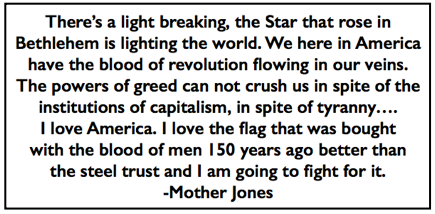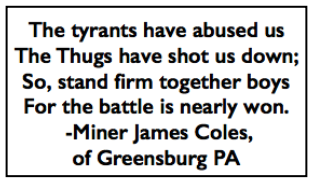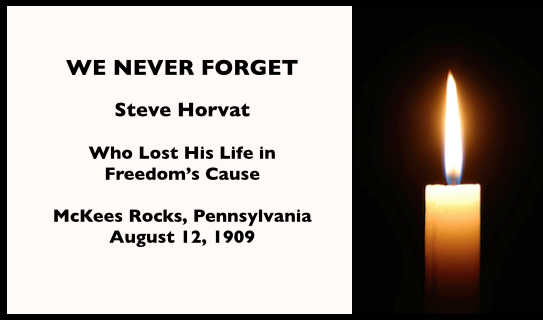 —————
—————
Hellraisers Journal – Wednesday January 15, 1913
“After a few years in the steel mills…..” by Lewis Hine
From The Coming Nation of January 11, 1913:
 —————
—————
Hellraisers Journal – Wednesday January 15, 1913
“After a few years in the steel mills…..” by Lewis Hine
From The Coming Nation of January 11, 1913:
 —————
—————
Hellraisers Journal – Saturday July 29, 1911
Paul Kellogg on the Defeat of the Westmoreland Miners’ Strike
From The Survey of July 29, 1911:
WESTMORELAND STRIKECALLED OFF
PAUL U. KELLOGG
After sixteen months, during which their strike was kept up in the heat of summer and the cold of hillside camps in winter, the men have given in in the Irwin-Greensburg field of western Pennsylvania. The main causes underlying this remarkable struggle, which President Hutchinson of the Westmoreland Company called civil war, were described in The SURVEY for December 3, 1910. Since then articles have appeared in Grit, Collier’s, the Philadelphia North American, and elsewhere, and this spring a hearing was held before the rules committee of the House at the instigation of Congressman Wilson.
The hearing did not lead to a federal investigation as the labor men had hoped, and this may have had some influence on the action of the international executive board of the United Mine Workers of America at Indianapolis on June 27. The board voted that there were no longer funds to continue sending $20,000 each week to Greensburg. According to a correspondent, two factors decided this action: the slack coal market has cut down mine work all over the country, and the members have been slow in sending in the tax which supports the striking miners and their families; in the second place, “a million dollars has already been expended here, with no immediate hope of settlement, and by losing this strike they will not endanger the miners’ chances in other strike zones, in Colorado especially, where another expensive strike is on .”
Following the action of the international board, a meeting of leaders was held in Greensburg and the strike was declared off on July 5.
 ———-
———-
 ———-
———-
From The Pittsburg Press of August 12, 1909:
Major Smith, Colored, Shoots Into
Attacking Crowd and Fatally
Wounds “Steve” Horvat
—–
PICKETS IN STRIKE ZONE
—–
More rioting, during which a foreigner was shot and killed, and the eviction of strikers and their families caused intense excitement in the Schoenville strike zone today.
Major Smith, a negro, said to be employed as a strike-breaker by the Pressed Steel Car Co., early this morning shot and killed “Steve” Horvat, one of the striking workmen. Smith was attacked by several foreigners and says he shot in self-defense. He was badly beaten up during the fight, and this afternoon was lodged in the county jail…..
Witnesses to the shooting say the negro fought at great odds and only fired when his life was endangered, and while lying on the ground, having been felled by a rain of blows from the fists of the strikers and a large rock wielded by one of the attacking party. The shooting occurred at 5 o’clock this morning.
The dead man was 27 years old, married living on Lewicki street, McKees Rocks. He leaves a wife and one child…..
At the strikers’ mass meeting today the death of Horvat was discussed and he was referred to as a martyr to the cause. A subscription fund was started to bear the funeral expenses and give aid to the widow. About $1,500 was subscribed, but some of this money will not be available until after the men get to work.
And it’s what will I tell to my three little children?
And what will I tell his dear mother at home?
And it’s what will I tell to my poor heart that’s dying?
My heart that’s surely dying since my darling is gone.
-Jean Ritchie
Hellraisers Journal, Friday January 17, 1908
Monongah, West Virginia – A Town of Broken Hearted Women and Girls
New Graves for Half the Town’s Breadwinners
Within a recent edition of the “Weekly Journal of Philanthropy and Social Advance,” Charities and the Commons, we find a long article, written by Paul U. Kellogg and illustrated by Joseph Stella, which tells the heartbreaking story of Monongah in the aftermath of great mine disaster of December 6th of last year. Today we offer a brief example of the writing of Mr. Kellogg along with illustrations by Mr. Stella.
From Charities and the Commons of January 4, 1908:
Monongah
Paul U. Kellogg
…..That morning five priests had held mass in St. Stanislaus’s Church and over twenty coffins were ranged in the low-ceilinged room in the basement. They were the first of one hundred and ten whom Father Joseph Letston counted as lost. Many of his people had come early to the church, a-foot, with bowed heads, sorrowing in low voices, sometimes a woman half held up by her companions, to that basement where the coffin lids closed in on blistered, swollen faces and parts of men. Four or five widows wept convulsively. An older woman read from a religious book held to the flickering light of a candle at the head of a closed coffin. A peasant, ugly with her pitted face, but beautiful in her great sorrow, bent often and kissed the lips of her husband.
All of a sudden there was a cry more piercing than the others. It was from an old mother who had lost seven—her husband, a son, two sons-in-law and three nephews. She had come upon one of them, and the people with her could scarcely hold her. She threw her head on the casket, and spoke to the boy fondly, trying to caress the crumpled face with poor, wrinkled hands. She had moaned all the way that morning from her lonely house to the church door, giving infinite sorrow to those who heard, and here her grief had at last found vent.

~~~~~~~~~~~~~~~~~~~~~~~~~~~~~~~~~~~~~~~~~~~~
Hellraisers Journal, Thursday January 16, 1908
Monongah, West Virginia – Hunger Reigns with Breadwinners Dead
Who among us could ever forget the following from journalist Dorothy Dale reporting from the devastated town after the great mine disaster:
Please letta me work, lady; gotta getta money…Please you get something for me, I can do.
A little hand touched my arm. The curl-framed face of a girl of 10 years looked into mine.
[She said pitifully:]
You know mans all dead. Boys all dead. Only girls left to work.
From The Labor World of January 11, 1908:
WIDOWS AND ORPHANS CRYING FOR BREAD
—–
Entire Burden of Every Industrial Disaster Falls
Upon the Poor Wage-earners’ Family.
—–
Bread Winners Killed By Wilful Negligence of
Their Employers, the Union Smashers.
—–
In the appeal issued by the Monongah Relief Committee it is stated that of the 3,000 inhabitants of Monongah the mine disaster destroyed one-half of the breadwinners. Two hundred and fifty wives, 1,000 children and many unborn children are left without means of support. The company has declared that the families occupying these houses may remain in them until other provision is made for them and in other ways has been generous in its attitude, but it states that operations cannot be resumed at the damaged mines until these houses are available for the new force. $200,000 is asked for by the Relief Committee to meet these needs. Commenting on the situation Paul U. Kellogg, special representative of Charities and The Commons, says:
“Oh, damn it, dagos are cheaper than props.”
-Mother Jones quoting a mine manager.
Hellraisers Journal, Wednesday December 11, 1907
Monongah, West Virginia – Little Orphan Girls Beg for Work
Journalist Dorothy Dale reports from the devastated town:
Please letta me work, lady; gotta getta money…Please you get something for me, I can do.
A little hand touched my arm. The curl-framed face of a girl of 10 years looked into mine.
[She said pitifully:]
You know mans all dead. Boys all dead. Only girls left to work.
From The Pittsburgh Press of Dec 10, 1907:
Fairmont, W. Va., December 10.-“Please letta me work, lady; gotta getta money.”
It was the appeal on every side in Monongah on Tuesday and it came from little girls, many of them not 10 years old. It is the newest development in the mine horror. Girls-mind you-not boys!
The boys of Monongah lie sleeping under the coal-weighted hills. Early Tuesday the corpse of a slender child form was brought out of No. 6. It was identified as Johnny Yaconis, and taken to the tumble down shack up in Red Row, over the mine, where a stony faced little woman kissed it until her face was black from the charred flesh. Another body, that of the boy’s father, Franco Yaconis, is still concealed in one of those underground rooms.
Dominic, her boy of 15, lies in the company hospital, where his crushed leg was amputated. Only her Johnny had been brought to her. “Devil Johnny,” they called him, but there was nothing devilish about him. At the age of 12 years the stunted little overalled figure trudged every morning to the mines, where he was a trapper. At 13 years of age he died in those mines.